Information/Write-up
SIDE ONE
Shake Sugaree
A sweet traditional song by Elizabeth Cotton, the author of “Freight Train.” We need sweet lullabyes again.
Freedom To Love
The state has no right to determine through laws which two people may not love.
Power In Me Blues
Germain May Aimee wrote this provocative little number in the 1920s.
Torture
In 1984 Amnesty reports stated “Children and women especially continue to be the victims of inhumanity and chemical abuse.”
The Ancestors
My final and difficult tribute to my Afro, Native, Celtic and other mixed heritage. I acknowledge Indian people to retain and survive against all odds.
Beloved Comrade
Lewis Allan wrote this piece (aka Abel Meeropol). He also penned “Strange Fruit.” With my dear comrade Bernadette, I rewrote the final section so this 1940s version one could still live on in this time.
SIDE TWO
Brown, Black and White Blues
Written by William (Big Bill) Broonzy in the late 1940s: America.
Aleticia
When my mom’s friend and I would laugh when the pain was too great to mourn.
Jellyroll
Alesa Glassey (of sensuality).
Poor Glory
A song written when people were apt to come to life with my anger after their mother died suddenly. Some gifts thus I would rather not receive.
Strange Fruit
A song written by Lewis Allan (Abel Meeropol). He showed Billie Holiday the song and she interpreted it into the horror story of American apartheid and the lynching of Black people. I honour her with this rendition.
I Black Woman
I teach who my story is, I will get through the racist/sexist ways to a Black Woman I once feared to live.
Auburn Tradition Records is a member of:
The Association for Independent Video and Filmmakers, The Centre for Independent Video, The Ontario Council of Folk Festivals, The Canadian Folk Music Society, The Canadian Independent Record Production Association.
I remember meeting Faith Nolan six years ago, though it seems like much longer today. She’d come to ask me about creating poetry for the Rainbow Women’s Festival which she and another sister were organizing. I had never heard of her, seen her name in some posters, but we’d never met though we lived in the same city and our paths were not unconnected. The Rainbow Women’s Festival was one of the best working class festivals for different races and cultural backgrounds; coming together to share our work and thinking that work is a bridge. She stood in front of the chairs in a suit that looked as though it came from army surplus, was black and wore a soldier’s beret, her voice was low, and she carried herself with the assurance of a trooper. I liked her persistence, it called my own will to write, to be, to persist. I told her it was impossible. The time was short and I was writing everything I could handle. Getting off the phone to Faith, I said, “Who wouldn’t be intrigued?” Who else would have the strength to organize a Festival of working class women of colour, lesbians, racialized women and other so deeply mired in the painful, marginal experience of other experiences, but still affirmed. From this and some of our other talks and those moments of rage and pleasure she has created music which has transformed me and my sense of magic and survival.
I said I would write something for her voice; in it are the contradictions and the magic she has sown in our lives. There are those of us who remember the voice in the night, the shout of grief from a city street, a prison cell, a factory, a child’s room, a playground. There are those of us who create out of that shout and never let it die — change is still possible. From a Black Lesbian/Working class/Two spirited/Artist comes the beauty and the complexity, the clear insight and the persistent hope. Through all the ordinary hurts she is extraordinary. Through all the rage and pain and laughter she is still “our girl,” still carving out the troubling lines against the status quo, still cleaning down off the rifeness meanness of everyday life.
Growing up in Halifax, Nova Scotia, and, later Toronto’s working class Cabbagetown, deepened her commitment to increasing the lives of Blacks and working class people in her songs. Her love of her own, and those of others who were slighted, fill her music. It makes her political work. A politic firmly rooted in her Black working class roots. She sings not only for us. She punches music up into the world. She doesn’t idealize her experience. She is uncompromising in her craft and her vision. She is unremitting. Faith is for all our liberations. She is a song we must carry with us every day.
Her voice is real. Her voice includes those not yet praise, the healer, the creator, the artist and the activist. With her music, she is creating the world a landscape that we live in, we will not accept the one into which we are placed, we are determined to create a more complex one.
This is a revolutionary sound and guitar. This feel’s voice is a quiet (not silent), insistent rage for justice. This voice is a strong sound, persistent, graceful. The feel’s voice is a continuous song.
-Dionne Brand, 1989
Dionne Brand is a Trinidadian Canadian Black poet/writer.
With comradely love and thanks
to Gary, Dionne, Angela, Rob, the Vancouver Folk Music Festival and Faith Nolan (my niece).
-Faith
Faith Nolan: vocals, guitar, foot tambourine
Columpa Carmen: chant vocals
Tania Lori Carter: chant vocals
Michael Creber: piano
Gaye Delorme: guitars
Roy Forbes: guitars, vocals
Boying Geronimo: percussion
Tom Hazlett: bass
Laurence Knight: bass
Sue Leonard: harmony vocals
Chris Nordquist; drums, percussion
Themba Tana: percussion
Produced by Roy Forbes
Recorded and mixed by Rolf Hennemann
Assisted by Marc L'Esperance
Recorded and mixed at Mushroom Studios, Vancouver, British Columbia in January, 1989
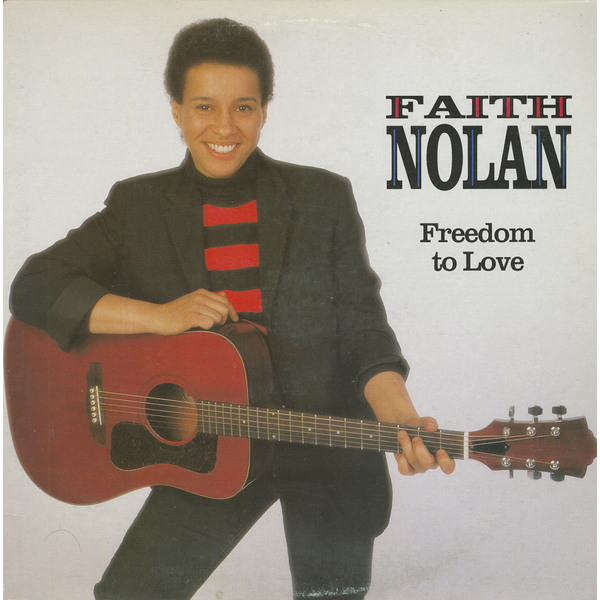
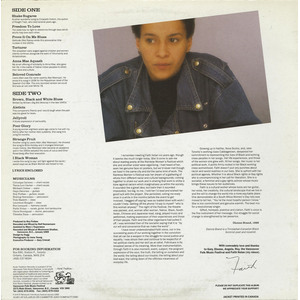
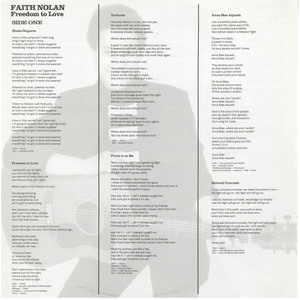
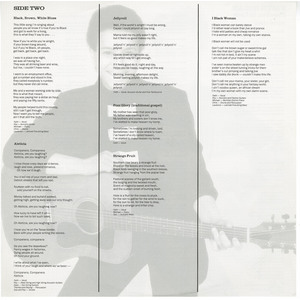
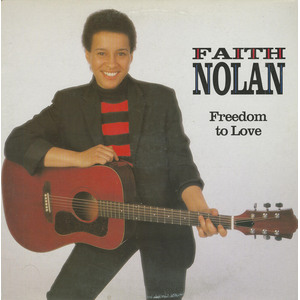
No Comments